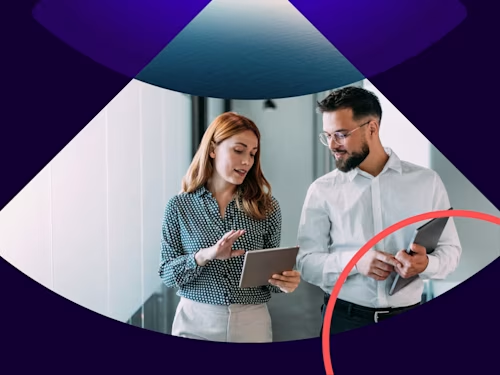
Electronic signatures and electronic witnessing in the UK
Some contracts require more than signing and need to be witnessed. Here, we explore the validity of electronic witnessing in the UK.

Electronic signatures and electronic witnessing in the UK
Use of electronic signature platforms, such as Docusign eSignature, is now a well-established business practice for many contracts and formal documents. Some documents, however, must comply with additional formalities. One situation that is particularly challenging is where deeds need to be executed, i.e. where there is typically a legal requirement for the witness to be physically present with the signer that they're witnessing for.
When does a document need to be witnessed?
For most contracts that require signature to be governed by English law there is no requirement for that signature to be witnessed. Nevertheless, parties sometimes like to include this additional step to emphasise the importance of the document and its correct signature and in certain circumstances a witness is legally required.
A common commercial situation that requires witnessing is with deed execution. A deed is a special kind of formal document. Under English law, a deed must be used for certain kinds of legal documents such as:
Land transfers,
Most security documents
Powers of attorney
Deeds are commonly used for other documents such as:
Shareholder agreements
Share and business purchase agreements
Loan documents
Transfers of assets
Guarantees
In this specific instance, there are particular formalities which apply to the execution of deeds, including a legal requirement for witnessing and that the witness must be in the physical presence of the signatory when the signatory signs the deed. When it comes to the selection of a witness, it must be someone who is not otherwise party to the document. For most documents, the witness does not need to be independent. This means that a signatory could use any convenient person as a witness.
If the parties choose to include a witness for a signatory but there is no legal requirement to do so, these formalities will not apply and remote witnessing of the application of the signature (including by video) is a possible option.
Under English law, a deed can be validly signed and witnessed using an electronic signature platform, such as Docusign eSignature, in situations where the law allows electronic signing.
What is electronic witnessing?
Electronic witnessing is where a witness is physically present with the signer and witnesses the application of a signatory's electronic signature and then adds their own electronic signature to confirm that witnessing.
With Docusign eSignature, this involves the signatory receiving the document for signature by email, specifying the name and email address of the witness and (once the signatory has applied their signature), the witness receiving a separate email asking them to add their signature and details.
Benefits of signing and witnessing on an electronic signature platform
All of the benefits of using electronic signature platforms are potentially available when signing deeds and other documents that need to be witnessed.
These benefits include:
Ease and speed of contracting—digitising the entire contract process with a digital workflow allows greater consistency in how document signatures are handled, the ability to digitally route the document, define signatory and witness signing order and to track the status of the document;
Removing the need for hard copy documents, printing and scanning at any stage
Auditability of the transaction details (signatories, timing, content) and clear evidence of which version of the document is being signed (which English case law relating to deeds suggests is important)
Admissibility in evidence—under both EU and UK law, electronic signatures are admissible in evidence
Reduced risk—additional verification steps can be used to confirm the identity of the signatory and witness
Environmental benefits of using less paper.
Global events over the last years have also highlighted the benefits of electronic signature platforms when signing contracts and other legal documents remotely, where there are social distancing restrictions or travel restrictions and where signatories have limited access to printers or scanners.
Witnessing signatures with Docusign eSignature
Docusign helps organisations digitally transform how they do business via contracts and other forms of agreements. Docusign provides solutions for signing and witnessing the signature of deeds electronically based on specific requirements and use cases, including HMLR deeds.
Docusign eSignature offers a fast and easy way to obtain signatures on documents that require a witness.
Get going quickly
Docusign eSignature and Docusign eWitness are flexible, easily configurable and easy to use for all parties, including senders, signers and witnesses.
Accelerate agreement completion
Digitise manual and paper-based processes to speed up the contracting process. What used to take weeks can now be completed within a few hours, or even minutes, and eliminate unnecessary printing of paper heavy agreements.
Capture witness evidence
Every document signed with Docusign eSignature comes with a Certificate of Completion that provides supporting evidence of the signature process and can be used in a legal dispute. For transactions with witness recipients, information about the witness, such as occupation, address, email address, IP address and time stamps, is also captured in the Certificate of Completion to provide auditability of signature and witnessing process to all transaction parties.
Ensure security
Stay confident with Docusign eSignature's security with strong encryption practices.
In summary: what is electronic witnessing in Docusign?
Electronic witnessing allows you to sign electronically and have a witness to your signature at the time of signing. Docusign eWitness is a feature of Docusign eSignature that allows users to select an individual to act as a witness for the signing of deeds and other documents like loan agreements or shareholder documents for directors in a company. Discover more about electronic signature witnessing.
When does a document need to be witnessed?
Deeds often need to be witnessed, and under English law, a deed must be used for certain kinds of legal documents such as Land transfers, Powers of attorney, transfer of assets and several security documents. Companies often used deeds for shareholder agreements, business purchase agreements and more.
How do I save time on electronic witnessing with Docusign?
Digitising manual and paper-based processes speeds up the contracting process, and what used to take weeks can now be completed within a few hours or even minutes. Using electronic witnessing eliminates unnecessary printing, scanning and posting of paper-heavy agreements. It also offers the benefit of routing, so it's easy for signatories and others to track progress. Discover how electronic witnessing helped improve conveyancing for HMLR deeds.
Read our latest whitepaper and learn more about electronic witnessing in the UK or contact our experts if you have any questions.
Related posts
Docusign IAM is the agreement platform your business needs



